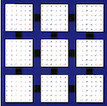25void PB_Ctzatrmv(
TYPE, SIDE, UPLO, TRANS, DIAG, M, N, K, IOFFD, ALPHA,
26 A, LDA, X, LDX, Y, LDY )
30 char * SIDE, * UPLO, * TRANS, * DIAG;
31 Int IOFFD, K, LDA, LDX, LDY, M, N;
207 if( ( M <= 0 ) || ( N <= 0 ) )
return;
216 TYPE->Fagemv(
C2F_CHAR( TRANS ), &M, &N, ALPHA, Aptr, &M, X, &LDX,
217 TYPE->one, Y, &ione );
221 TYPE->Fagemv(
C2F_CHAR( TRANS ), &M, &N, ALPHA, Aptr, &M, X, &ione,
222 TYPE->one, Y, &LDY );
224 if( Aptr ) free( Aptr );
230 TYPE->Fagemv(
C2F_CHAR( TRANS ), &M, &N, ALPHA, A, &LDA, X, &LDX,
231 TYPE->one, Y, &ione );
235 TYPE->Fagemv(
C2F_CHAR( TRANS ), &M, &N, ALPHA, A, &LDA, X, &ione,
236 TYPE->one, Y, &LDY );

